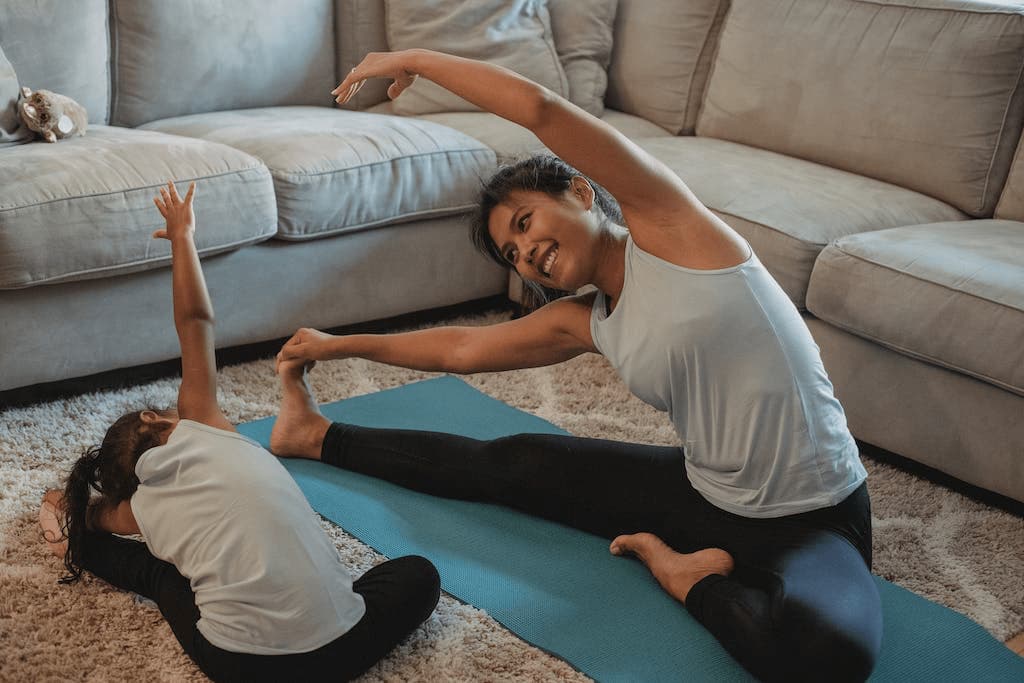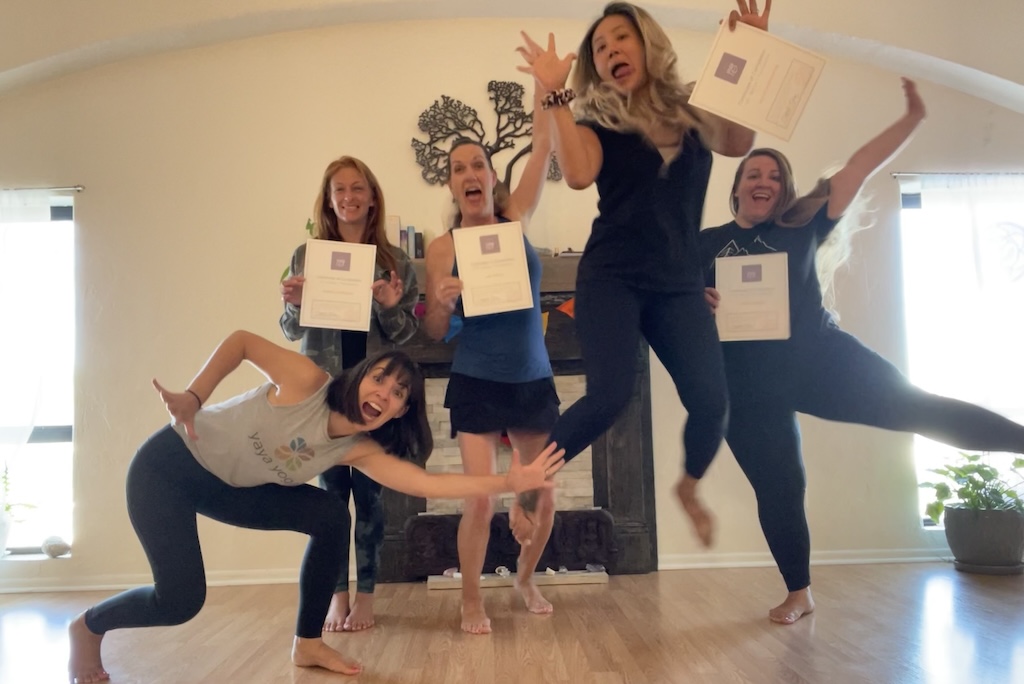
Press PLAY to listen to this post.
As we step into the Lunar New Year, marked by vibrant celebrations and rich cultural traditions, it's a perfect time to embrace mindfulness and wellness, especially for our little ones. This year, as we welcome the Year of the Dragon, let's explore how combining kids yoga with the festivities can create a beautiful tapestry of movement, mindfulness, and cultural appreciation.
Kids Yoga: Cultivating Mindfulness and Joy
Kids yoga offers a playful and engaging way for children to develop body awareness, strength, flexibility, and concentration while fostering a sense of calmness and relaxation. Through yoga poses, breathing exercises, and creative activities, children can explore their bodies, emotions, and imagination in a safe and supportive environment.
Bringing Lunar New Year Traditions to the Mat
The Lunar New Year, also known as Chinese New Year, is a time of joyous festivities, colorful decorations, and symbolic rituals. Each year is associated with a specific animal from the Chinese zodiac, and 2024 marks the Year of the Dragon – a symbol of power, strength, and good fortune.
Embracing Wellness and Cultural Diversity
As we celebrate the Lunar New Year of the Dragon and delve into the world of kids yoga, let's embrace the opportunity to promote wellness, mindfulness, and cultural diversity among children. Through joyful movement, creative expression, and a spirit of curiosity, we can inspire the next generation with the strength and power to cultivate compassion, respect, and gratitude for the rich tapestry of traditions that make our world so vibrant and beautiful.
Yoga is a daily celebration that nourishes both body and soul, leaving hearts full and spirits soaring like the majestic dragons that grace the skies. Wishing you all a joyful and peaceful Lunar New Year filled with love, laughter, and mindful connection! Namaste ???
Join our Lunar New Year family yoga event Sunday, February 4.

Press PLAY to listen to this post.
Did you know 80% of people have already given up on their dreams of things being different in 2024? Yep! Only two weeks into the year, by the second Friday in January, most of us have already abandoned our New Year’s goals. It’s so real, it’s got a name: Quitters Day.
People have fallen off the wagon of dry January. They’ve ghosted the gym or yoga classes. They have fallen back into old and familiar patterns. Why?! Because it takes a lot of practice to change a habit like at least 30 to 60 days. And it’s hard for the brain to unlearn a pattern of behavior.
You could stay in bed and be late for school…and why make the bed at all?!
You may as well have another cookie…You deserve it, right?
Why bother with the details of the homework assignment when you know you can get away without doing it?
Why not waste a bunch of time eating/watching/scrolling/thinking/shopping/gossiping? It’s fun, right? No real harm…
Except when you break your promises to yourself, you don’t feel good. It feels horrible; but you’re not bad, weak, or hopeless. You just need more reps. Repetition is key.
Doing the right thing — by you for you — even when it’s easy not to — IS the muscle.
Keeping your promises to yourself builds trust in YOU because if you don’t trust you, no one else can trust you either. It builds your resilience and your confidence.
Being consistent is the hardest thing to do. How can it work? Mindfulness. Whatever it is you are trying to do — or not do, hits a decision making point. The power is in the pause so you can make a conscious decision of what BEST serves you. And it’s rarely your first impulse.
STOP! Wait for the angst to settle. Then make the best decision. FOMO turns into JOMO. We spend more quality time and attention on the routines, events, and resources that TRULY move us upward.
If you’ve fallen off in the past days or weeks, GET BACK ON! Start over. It’s 100% okay. Reaching our biggest goals does not require perfection, only progress. The secret is to keep getting BACK up. Again, and again, and again.
P.S. Come to yoga with the fam. It’s healthy fun!

Press PLAY to listen to this post.
In our fast-paced and digitally dominate world, giving our children the gift of yoga equips them with essential skills for a balanced and healthy lifestyle. Through structured classes or playful at-home sessions, getting your kids life-ready opens the door to a world of physical, mental, and emotional well-being that benefits them for years.
1. Physical Fitness & Flexibility
Yoga postures develop strength, flexibility, coordination, and balance, laying a foundation for a healthy activity for life.
2. Mental Health & Stress Relief
Yoga builds mindfulness and relaxation skills. Through focused breath-work, kids learn to manage stress, anxiety and depression for their emotional wellness and a sense of calm.
3. Improved Concentration & Focus
In yoga, children learn to be present in-the-moment, lengthen and sharpen their attention, positively impacting their performance academically and in activities.
4. Emotional Regulation
In yoga, children learn emotional awareness and how to regulate so they can express their feelings in a healthy way, promoting higher emotional intelligence and resilience.
5. Enhanced Sleep Quality
Moving and relaxing equal improved sleep quality for children. Simple bedtime yoga sequences can create a calming routine, aiding in a more restful night’s sleep.
6. Boosted Confidence and Self-Esteem
Mastering yoga poses and participating in group activities creates accomplishment. Yoga provides a non-competitive environment where each child can progress at their own pace.
7. Social Interaction and Team Building
Partner and group poses along with collaborative activities create a sense of connection and community, teaching children valuable interpersonal skills.
8. Mind-Body-Heart Connection
Yoga unites all of us inside and out helping children understand the importance of listening to their bodies. This inner guidance can lead to healthier lifestyle choices and lifelong well-being.
9. Creative Expression
Yoga movement inspires children to express themselves in a unique and imaginative way, blossoming creativity and self-discovery.
10. Life-Ready Healthy Habits
Introducing yoga to children establishes a foundation for lifelong healthy habits. Teaching them the practical ways to take care of their physical and mental health so they can be their best!
Adapted slightly because it was already spot on! You can learn the High5 Habits and success skills to get your kids life-ready in Warrior Training in just 8 days so you can impact kids immediately.

Press PLAY to listen to this post.
If you live or work with kids, you need to be a warrior. Since kids don't come with instructions, we built a science-backed system so your on-the-job training is more satisfying. Here's why kids yoga and mindfulness training can help you succeed in the hardest job in the world: raising healthier and happier children.
1 Mission: Unite body, mind and heart.
2 Goals: protect and promote children’s physical fitness & mental health.
3 Success skills: Adaptability. Resilience. Confidence! When you adapt, you become resilient. When you are resilient, you can handle anything. When you can handle anything, you are confident. Confidence is everything!
4 Areas of development:
- Mental - focus
- Emotional - regulation
- Physical - strength, flexibility and balance
- Spiritual - a higher power defined by you
High5 Habits for life:
- Mindfulness - pay attention
- Movement - exercise!
- Meditation - be still with yourself
- Mantra - train your mind
- Manifesting magic - get what you want!
6 Senses engaged: Sight. Sound. Smell. Taste. Touch. Vibes - the ability to read energy and respond to it.
7 Energy centers in the body:
- Safety - feel grounded
- Creativity - experience joy
- Power - have strength
- Love - compassion for self and others
- Voice - speak responsibly and kindly
- Knowing - understanding oneself
- Wonder - curiosity outside of self
8 Limbs of yoga:
- Yama - 5 self disciplines
- Niyama - 5 positive duties
- Asana - Postures and movement (lots of it!)
- Pranayama - Breath work
- Pratyahara - Relax into peace
- Dharana - Focused concentration
- Dhyana - Meditation
- Samadhi - Happiness. Bliss. Enlightenment.
Get to Cloud 9 reach to your highest height making money doing meaningful work that matters. Yoga helps you be your best! You can’t learn this essential skill set anywhere else.
10 Ways to be a game-changer in your life and in your community working with:
- Families
- Babies
- Toddlers
- Kids
- Middle Schoolers
- High School Teens
- College students
- Youth Sports Coaches
- Classroom Teachers
- Parents & Caregivers
Increase your income and your impact. Warrior training starts January 20, 2024.
